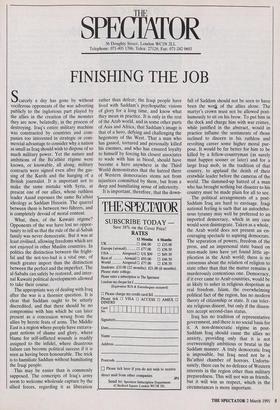SPECTATOR
56 Doughty Street, London WC1N 2LL Telephone: 071-405 1706; Telex: 27124; Fax: 071-242 0603
FINISHING THE JOB
Scarcely a day has gone by without vociferous opponents of the war adverting publicly to the inglorious part played by the allies in the creation of the monster they are now, belatedly, in the process of destroying. Iraq's entire military machine was constructed by countries and com- panies too interested in strategic or com- mercial advantage to consider why a nation as small as Iraq should wish to dispose of so much military power. Yet the nature and ambitions of the Ba'athist regime were known, or knowable, all along; military contracts were signed even after the gas- sing of the Kurds and the hanging of a British journalist. It is important not to make the same mistake with Syria, at present one of our allies, whose ruthless leader Assad espouses the same Ba'athist ideology as Saddam Hussein. The quarrel between them is between two fiihrers, and is completely devoid of moral content.
What, then, of the Kuwaiti regime? Opponents of the war have lost no oppor- tunity to tell us that the rule of the al-Sabah family was never democratic. But it was at least civilised, allowing freedoms which are not enjoyed in other Muslim countries. In politics the distinction between the fright- ful and the not-too-bad is a vital one, of much greater import than the distinction between the perfect and the imperfect. The al-Sabahs can safely be restored, and inter- nal Kuwaiti political developments allowed to take their course.
The appropriate way of dealing with Iraq after the war is a thornier question. It is clear that Saddam ought to be utterly discredited, and that there should be no compromise with him which he can later present as a concession wrung from the allies by heroic feats of arms. The Middle East is a region where people have extrava- gant notions of shame and glory, where blame for self-inflicted wounds is readily assigned to the infidel, where disastrous failure can become political success if it is seen as having been honourable. The trick is to humiliate Saddam without humiliating the Iraqi people. This may be easier than is commonly supposed. The conscripts of Iraq's army seem to welcome wholesale capture by the allied forces, regarding it as liberation rather than defeat; the Iraqi people have lived with Saddam's psychopathic visions of glory for a long time, and know what they mean in practice. It is only in the rest of the Arab world, and in some other parts of Asia and Africa, that Saddam's image is that of a hero, defying and challenging the hegemony of the West. That a man who has gassed, tortured and personally killed his enemies, and who has ensured loyalty to himself by forcing his closest associates to wade with him in blood, should have become a hero anywhere in the Third World demonstrates that the hatred there of Western democracies stems not from injustices committed by them, but from a deep and humiliating sense of inferiority. It is important, therefore, that the down- fall of Saddam should not be seen to have been the work of the allies alone. The martyr's crown must not be allowed post- humously to sit on his brow. To put him in the dock and charge him with war crimes, while justified in the abstract, would in practice inflame the sentiments of those inclined to discern in his ruthless and revolting career some higher moral pur- pose. It would be far better for him to be killed by a fellow-countryman (as surely must happen sooner or later) and for a large Iraqi mob, in the tradition of that country, to applaud the death of their erstwhile leader before the cameras of the world. The dammed-up hatred of a man who has brought nothing but disaster to his country must be made plain for all to see.
The political arrangements of a post- Saddam Iraq are hard to envisage. Iraqi national feeling is such that an autochtho- nous tyranny may well be preferred to an imported democracy, which in any case would soon disintegrate. Taken as a whole, the Arab world does not present an en- couraging spectacle to aspiring democrats. The separation of powers, freedom of the press, and an impersonal state based on man-made laws have yet found little ap- plication in the Arab world; there is no consensus about the relation of religion to state other than that the matter remains a murderously contentious one. Democracy, if it ever came to Arab countries, would be as likely to usher in religious despotism as real freedom. Islam, the overwhelming political fact of the region, has no modern theory of citizenship or state. It can toler- ate religious dissent, but only if the dissen- ters accept second-class status.
Iraq has no tradition of representative government, and there is no social basis for it. A non-democratic regime in post- Saddam Iraq should cause the allies no anxiety, providing only that it is not overweeningly ambitious or brutal in the Saddam manner. A truly democratic Iraq is impossible, but Iraq need not be a Ba'athist chamber of horrors. Unfortu- nately, there can be no defence of Western interests in the region other than military preparedness. This will not win us friends, but it will win us respect, which in the circumstances is more important.


















































 Previous page
Previous page